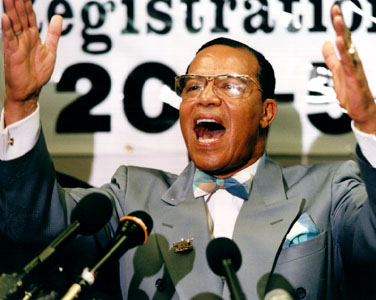 David Lepeska’s New York Times article “Farrakhan Using Libyan Crisis to Bolster His Nation of Islam” brought the once prominent Nation of Islam (NOI) leader back, however briefly, into the limelight. Throughout the 1980s and 1990s, Louis Farrakhan was a master at attracting a disproportionate amount of attention, particularly media coverage.
David Lepeska’s New York Times article “Farrakhan Using Libyan Crisis to Bolster His Nation of Islam” brought the once prominent Nation of Islam (NOI) leader back, however briefly, into the limelight. Throughout the 1980s and 1990s, Louis Farrakhan was a master at attracting a disproportionate amount of attention, particularly media coverage.
A bright, talented, and charismatic, but provocative and controversial, speaker, Farrakhan denounced the many causes of racism and poverty, and gave voice to the grievances of African Americans and other minorities, enhancing his stature even among those who chose not to join his organization. His Million Man March in 1995 appealed to a broad cross-section of Americans, including both Christian and Muslim leaders and organizations. At the same time, he remained controversial for his strident, separatist message, his anti-Semitism, and his international connections with militant leaders, such as those of Libya and Iran.
Farrakhan’s ability to make front page headlines, including the cover of Time Magazine, obscured the extent to which he and the NOI were a fringe, rather than mainstream, movement in the world of Islam in general and in the American Muslim community in particular. Although the Nation of Islam had far fewer members than Warith Deen Muhammad’s American Muslim Mission, Farrakhan’s persona and actions gave him and the Nation a disproportionate amount of name recognition and visibility. For many Americans, he was the voice of Islam as well as of specifically African American Islam. In the Q & A following a keynote address that I delivered at the launch of one of the first endowed Islamic Studies chairs in America, a Muslim American of South Asian background complained that media fascination with Farrakhan had led many Americans to believe that this aberrant sect represented orthodox Islam. A short time later, when a PBS program did a show on Muslim Americans, the lead reporter in a pre-interview was stunned when I pointed out to her that solely covering Farrakhan in her segment on African American Muslims was grossly misleading. She neither knew Warith Deen Muhammad nor was she aware that his following was exponentially greater than that of Farrakhan. Even though she reluctantly agreed to include coverage of Warith Deen, on the day of my interview she again asked for assurances of his importance.
In recent years, in terms of both numbers and recognition, Farrakhan and the NOI have become a marginal movement with little following or attraction among most Muslims globally as well as in the U.S., where the vast majority of African American or black American Muslims follows mainstream Islam. Although Farrakhan has signaled a desire to situate the NOI within mainstream Islam, and though he has introduced some changes to that end, the NOI’s belief system still contradicts many basic tenets of Islam.
Recently, Farrakhan has been almost invisible and silent, struggling with health problems and with a sharp decrease in the membership of the NOI. Given his past tendency, if not compulsion, to speak out on national and international issues and his success in capturing media attention, his recent endorsement of Muammar Qaddafi should come as no great surprise. For many years, he developed and emphasized connections with Africa and enjoyed Qaddafi’s friendship and financial support. His statement—“What kind of brother would I be if a man has been that way to me, and to us, and when he’s in trouble I refuse to raise my voice in his defense?”—may win the respect of die-hard supporters. However, many others, including past admirers, nationally and internationally, in the Muslim community and elsewhere, will see him as a man who has lost his moral compass by supporting and defending a tyrant who is slaughtering his people—women, children, and men.











